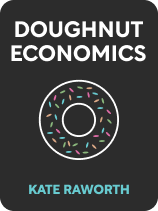

This article is an excerpt from the Shortform book guide to "Doughnut Economics" by Kate Raworth. Shortform has the world's best summaries and analyses of books you should be reading.
Like this article? Sign up for a free trial here .
What are the core economic assumptions? Do the current economic assumptions align with the ultimate goal of economics?
According to Kate Raworth, economics has developed some core assumptions about human nature, what an economy exists to do, and what the social science of economics is meant to achieve. According to her, if the economy is to better serve humanity’s needs, these core assumptions need to change.
Here’s why the traditional economic assumptions are flawed, according to Raworth.
Utility and Growth
Raworth observes that traditional economics places great stock in the concept of utility: the satisfaction or value an individual receives from goods and services. The utility gained is usually synonymous with the price paid.
In her view, the economic assumption of utility takes too narrow a view of the full range of human needs and desires, since many of our core emotional and spiritual needs can’t be purchased through markets, nor can their value be precisely quantified in monetary terms. These “goods” like love, empathy, childcare, and all other forms of emotional support are essential to the holistic health of the human beings who provide the labor that make the economy function. The providers of such “goods” contributions, while uncompensated financially for their labor, are not secondary to the working of the economy—they are essential to it.
(Shortform note: In What Money Can’t Buy, Michael Sandel echoes Raworth’s argument that it’s impossible to put a price on “goods” like love, empathy, or family. In fact, he argues that applying market values to such areas of the human experience corrupts them. He writes that simply subjecting them to market conditions alters our attitudes toward them and degrades our collective moral and social well-being—forcing us to treat these virtues as mere commodities whose value is reflected in their price instead of having intrinsic, non-monetary value.)
Building off the concept of utility, economists usually argue that the best way to increase human happiness is to boost economic growth to deliver as much utility to as many people as possible. Under this influence, Raworth argues, economic growth has become policymakers’ panacea for all of society’s ills. No matter the problem—poverty, unemployment, crime—economic growth is the solution. Unfortunately, she writes, many of these social problems cannot be addressed by the workings of the market, and in fact, many are exacerbated by the dynamics of unfettered markets.
(Shortform note: Defenders of free markets would argue that Raworth’s concerns about market values ignore the great benefits that capitalism-driven economic growth has delivered to humanity. Some commentators write that the spread of capitalism has been the single most important factor in alleviating global poverty and raising worldwide standards of living. In the 200 years since the dawn of the Industrial Revolution—the period of the strongest economic growth in human history—the share of the world population living in extreme poverty has fallen from 94% to less than 10%.)
Staying Inside the Doughnut
But, Raworth argues, unchecked economic growth has put us on the wrong side of both the doughnut rings. Despite progress, according to Raworth, we still have too much poverty, food insecurity, lack of opportunity, and other problems of deprivation. Markets may be extraordinarily efficient at distributing resources—through the invisible hand of supply and demand determining which goods are produced, in what quantities, at what price, and who ultimately receives them. However, left unchecked, they will also produce too many harmful by-products (like pollution and inequality) and too few social goods (like health care, education, and clean energy). Moreover, Raworth writes that we have pushed economic growth so far that some bad environmental outcomes may now be unavoidable.
Raworth writes that five factors will determine whether or not we stay within the doughnut (meeting everyone’s basic needs sustainably).
1. Population: The more of us there are, the more of the planet’s resources we’ll consume. Fortunately, Raworth notes, population growth has been falling thanks to improvements in health and well-being that empower women to control family size.
2. Inequality: We need a more equitable distribution of what our planet and our economy produce. Raworth writes that problems like food insecurity are not borne of scarcity; they come from a wasteful, inefficient, and unjust spread of the planet’s bounty.
3. Vision: We need to have a clear vision of what we consider the necessities for every human being on the planet to lead a fulfilling and comfortable life. Part of the answer, Raworth suggests, may be a move away from rampant consumerism, which is often wasteful and largely exists to display our wealth to others in the form of conspicuous consumption.
4. Technology: Raworth writes that technologies that provide for social well-being while sustaining the environment—like green infrastructure, renewable energy, and sustainable agriculture—will be critical to our efforts to stay within the doughnut.
5. Government: We need governments at the local, national, and supranational levels to be agile, flexible, and responsive to society’s needs. This means focusing on the common good and sometimes sacrificing local or national concerns, while having the political courage to take on powerful special interests.

———End of Preview———
Like what you just read? Read the rest of the world's best book summary and analysis of Kate Raworth's "Doughnut Economics" at Shortform .
Here's what you'll find in our full Doughnut Economics summary :
- Why we need a top-to-bottom redesign of our global economic order
- Why long-term economic growth is unsustainable
- How inequality fuels a feedback loop that leads to more inequality






